Writing sideblog • they/them • 20 • I like D&D, girls w swords, and Mary Olliver's Black Oaks poem
Don't wanna be here? Send us removal request.
Text
unstoppable force (i want to see this tragic character survive and heal) vs immovable object (their death was the most thematic and narratively satisfying resolution possible for their character arc and anything less than death just feels cheap)
49K notes
·
View notes
Text
I am now the one and only person to have tagged a fanfic Trans Daisy Buchanan
Do y'all remember when Daisy cried bc her child was born a girl? When she stayed with perfect manly Tom bc he validated her existence as a rich woman in America? When Nick said, "He looked at her the way all women want to be looked at by a man" and she "fell back in love" with Gatsby (see: felt validated as a woman)?
Comphet trans Daisy. I'm right.
#greater gatsby#a late report on jay gatsby#im a great gatsby analyzer now#theres actually a lot of content#its message hits a little too close to home :\#transgender#lgbt#trans writing#great gatsby
5 notes
·
View notes
Text
Genuinely why has nobody done a transgender Great Gatsby rewrite. Why has nobody rewritten Great Gatsby as a commentary on how queer ppl are consumed as entertainment but not given a place at the table. It's been public domain for two years now where is it.
Nick Carraway is a transmasc egg who is simultaneously repulsed by and fascinated by Gatsby's transition. Daisy Buchanan is a trans woman clinging to perfect cishet Tom to prove her worth as a woman. Jordan Baker is a lesbian.
Gatsby believes the world could be good to trans people without taking everything from them, and Nick is foolish enough and ashamed to hope that Gatsby is right.
#im doing it myself i guess#greater gatsby#great gatsby#fanfiction#literature#writeblr#transgender#lgbt
25 notes
·
View notes
Text
you can explain why it’s important for aspiring authors to read published books and not just fanfiction without condescending to fanfiction authors/readers and implying it’s inherently of lesser quality
52K notes
·
View notes
Text

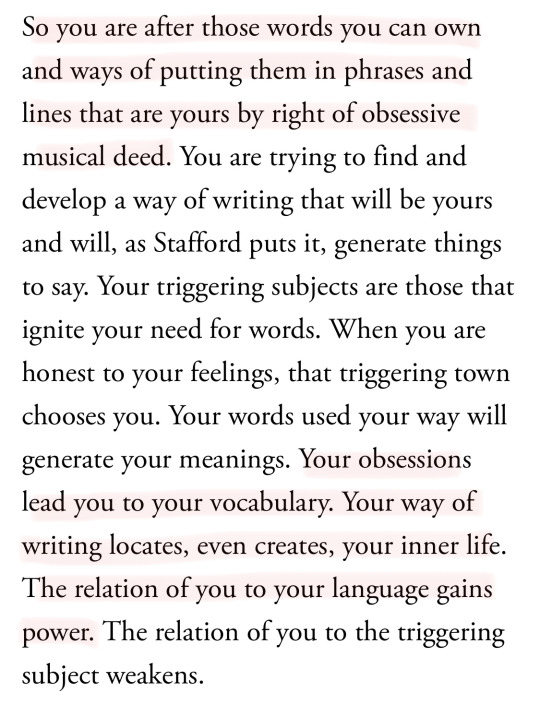
Richard Hugo, Essay on Poetic Theory: The Triggering Town
37K notes
·
View notes
Photo

Alicia Ostriker, from The Imaginary Lover; “Surviving”
9K notes
·
View notes
Text
alright unhinged time travel concept here we go— the protagonists are all children that were ‘unwritten’ when a time traveler did something to prevent their birth
811 notes
·
View notes
Text
“In college I had a physics professor who wrote the date and time in red marker on a sheet of white paper and then lit the paper on fire and placed it on a metallic mesh basket on the lab table where it burned to ashes. He asked us whether or not the information on the paper was destroyed and not recoverable, and of course we were wrong, because physics tells us that information is never lost, not even in a black hole, and that what is seemingly destroyed is, in fact, retrievable. In that burning paper the markings of ink on the page are preserved in the way the flame flickers and the smoke curls. Wildly distorted to the point of chaos, the information is nonetheless not dead. Nothing, really, dies. Nothing dies. Nothing dies.”
— Nicholas Rombes, The Absolution of Roberto Acestes Laing (via bobschofield)
95K notes
·
View notes
Text
the thing you need to realize about localization is that japanese and english are such vastly different languages that a straight translation is always going to be worse than the original script. nuance is going to be lost and, if you give a shit about your job, you should fill the gaps left with equivalent nuance in english. take ff6, my personal favorite localization of all time: in the original japanese cefca was memorable primarily for his manic, childish speaking style - but since english speaking styles arent nearly as expressive, woolsey adapted that by making the localized english kefka much more prone to making outright jokes. cefca/kefka is beloved in both regions as a result - hell, hes even more popular here
94K notes
·
View notes
Text
Science fiction is full of first contact stories, but is there a such thing as LAST contact? Decide exactly what that means, and write about it.
96K notes
·
View notes
Text
writing an autistic character when you are not autistic - a masterpost
completely double spaced version on google docs here – this post is more blocky for the sake of people’s dashboards, but still long so people will be less likely to glaze over it. my apologies if that makes it hard to read
things to look for and avoid in an autistic character
• symptoms only manifesting as “nonverbal and rocking” • super smart / living calculator • super dumb / doesn’t understand anything • all the symptoms you can come up with for them are “awkward” and “has special interest(s)” (please do more research) • trains, technology, and/or math as special interests • acting like a child • getting treated like a baby • unreasonably cruel and uncaring about others’ reactions to them being cruel • if they’re comparable to sheldon from the big bang theory, start over • animal comparisons • a lack of feelings • please no stories about what it’s like to be autistic told by allistics
the right way to write an autistic person
• lots of symptoms, including secondary ones not included on a general diagnosis requirement list (here’s a list i rather like that was made by an autistic person – their blog is also a good resource) • having a good amount of general knowledge and actually talking about it (i cannot believe that i have to say this) • talking about things outside of special interests (again…. come on……….) (special interests are usually the default things our brains go to when theres no stimulation or we want to entertain ourselves – it isn’t literally all we think or talk about ever. if a conversation has no connections to a special interest, reconsider having your autistic character bring it up in a context that is not an introduction.) • explicitly expressed to be capable of attraction and romantic feelings – if your character is an adult, add sexual feelings to this point • capable of general functioning, just with a disability that makes it more difficult – not a walking disability (….sigh) • a wide amount of feelings and emotional turmoil (but perhaps only being able to express it in limited ways) • we’re people • just people whose brains are wired differently
things to avoid in research for an autistic character
• autism moms / autism blogs and websites not run by autistic people • any affiliation with autism $peaks means you should walk away and never look back • a scientist trying to create explanations for what autistic people do without actually asking / not mentioning asking autistic people • anything about a cure for autism • a person that “worked with autistic kids” phrased in the same way as “worked with animals” • talking about autistic people as if they are mysteries, are like animals, or are otherwise othered weirdos instead of people
things to look for in research for an autistic character
• actual autistic people talking about their experiences and symptoms • just stick to that and you’re good but it’s hard to find sometimes ngl. just look for the above red flags
things i would personally like to see in an autistic character
• less easy to swallow sadness and more destructive anger. i would love to see a canonically autistic character who was frustrated easily by small things and had trouble communicating why • not a story about being autistic, a story that happens to have a character or characters who are autistic – it isn’t pointed out or questioned, they’re right at home with the rest of the cast and not othered (a la symmetra from overwatch) • intensive sensory issues / small sounds making large reactions • clear communications about not liking x sensory thing (for example being touched) • poor motor skills / clumsiness and not being laughed at for it • walking funny (body bent downwards, walking very fast, walking slowly, big strides, shuffling, stiffness, etc) – no one treats it as if it’s funny or something totally strange • a big personality that has a presence so they can’t be cast aside (but feel free to have quiet characters too) – if this was along with being nonverbal they would probably leap to being one of my favorite characters ever • a fear of asking for clarification on sarcasm or jokes because of past experiences and an arc about the character becoming more comfortable asking questions
>> if any fellow autistic people want to add something, feel free <<
allistics are encouraged to rb this
102K notes
·
View notes
Photo
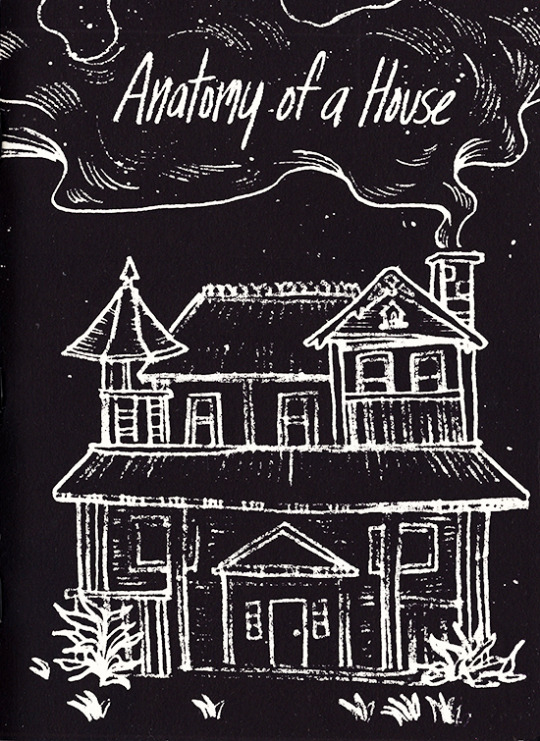
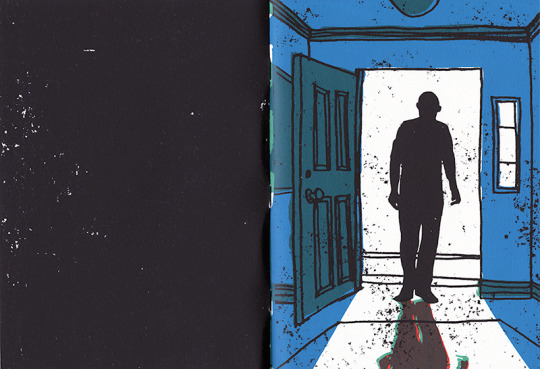
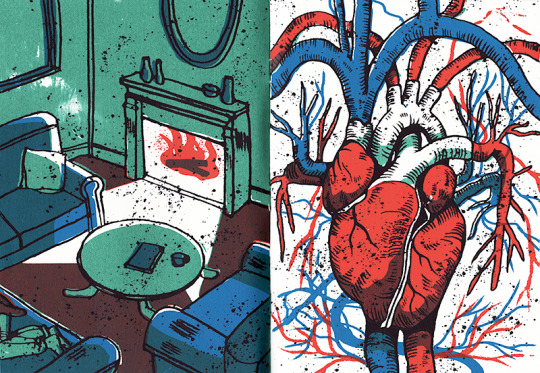
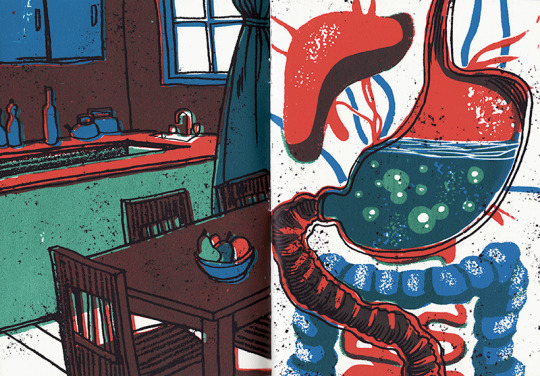
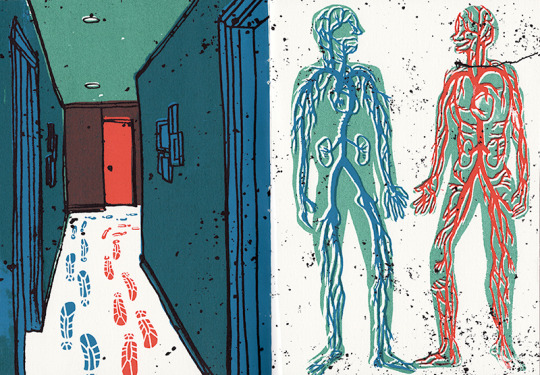
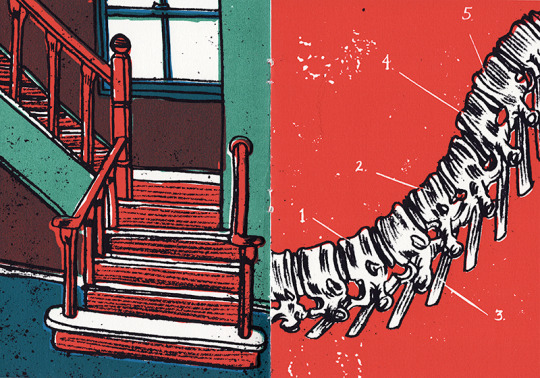
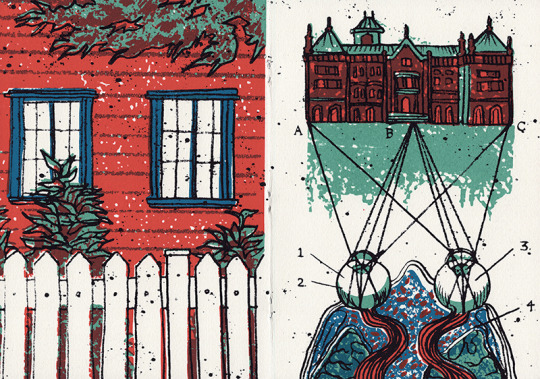




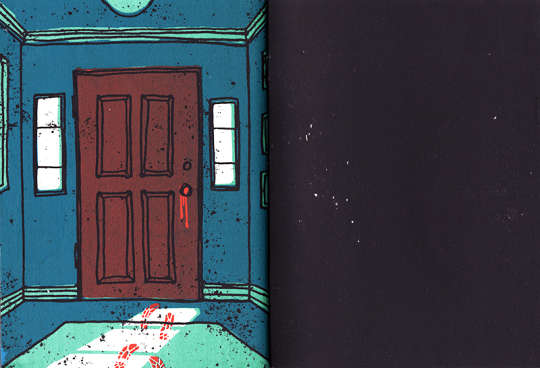

After three months of labor-conducive love, my silkscreen book is complete!
Based off of the video game ANATOMY, it tells the story of what it really means to live in a haunted house
This game has some of the best writing and one of the most original ideas I’ve seen in a while, so please, take a look!
87K notes
·
View notes
Text
Writing advice #?: Have your characters wash the dishes while they talk.
This is one of my favorite tricks, picked up from E.M. Forester and filtered through my own domestic-homebody lens. Forester says that you should never ever tell us how a character feels; instead, show us what those emotions are doing to a character’s posture and tone and expression. This makes “I felt sadness” into “my shoulders hunched and I sighed heavily, staring at the ground as my eyes filled with tears.” Those emotions-as-motions are called objective correlatives. Honestly, fic writers have gotten the memo on objective correlatives, but sometimes struggle with how to use them.
Objective correlatives can quickly become a) repetitive or b) melodramatic. On the repetitive end, long scenes of dialogue can quickly turn into “he sighed” and “she nodded” so many times that he starts to feel like a window fan and she like a bobblehead. On the melodramatic end, a debate about where to eat dinner can start to feel like an episode of Jerry Springer because “he shrieked” while “she clenched her fists” and they both “ground their teeth.” If you leave the objective correlatives out entirely, then you have what’s known as “floating” dialogue — we get the words themselves but no idea how they’re being said, and feel completely disconnected from the scene. If you try to get meaning across by telling us the characters’ thoughts instead, this quickly drifts into purple prose.
Instead, have them wash the dishes while they talk.
To be clear: it doesn’t have to be dishes. They could be folding laundry or sweeping the floor or cooking a meal or making a bed or changing a lightbulb. The point is to engage your characters in some meaningless, everyday household task that does not directly relate to the subject of the conversation.
This trick gives you a whole wealth of objective correlatives. If your character is angry, then the way they scrub a bowl will be very different from how they’ll be scrubbing while happy. If your character is taking a moment to think, then they might splash suds around for a few seconds. A character who is not that invested in the conversation will be looking at the sink not paying much attention. A character moderately invested will be looking at the speaker while continuing to scrub a pot. If the character is suddenly very invested in the conversation, you can convey this by having them set the pot down entirely and give their full attention to the speaker.
A demonstration:
1
“I’m leaving,” Anastasia said.
“What?” Drizella continued dropping forks into the dishwasher.
2
“I’m leaving,” Anastasia said.
Drizella paused midway through slotting a fork into the dishwasher. “What?”
3
“I’m leaving,” Anastasia said.
Drizella laughed, not looking up from where she was arranging forks in the dishwasher. “What?”
4
“I’m leaving,” Anastasia said.
The forks slipped out of Drizella’s hand and clattered onto the floor of the dishwasher. “What?”
5
“I’m leaving,” Anastasia said.
“What?” Drizella shoved several forks into the dishwasher with unnecessary force, not seeming to notice when several bounced back out of the silverware rack.
See how cheaply and easily we can get across Drizella’s five different emotions about Anastasia leaving, all by telling the reader how she’s doing the dishes? And all the while no heads were nodded, no teeth were clenched.
The reason I recommend having it be one of these boring domestic chores instead of, say, scaling a building or picking a lock, is that chores add a sense of realism and are low-stakes enough not to be distracting. If you add a concurrent task that’s high-stakes, then potentially your readers are going to be so focused on the question of whether your characters will pick the lock in time that they don’t catch the dialogue. But no one’s going to be on the edge of their seat wondering whether Drizella’s going to have enough clean forks for tomorrow.
And chores are a cheap-n-easy way to add a lot of realism to your story. So much of the appeal of contemporary superhero stories comes from Spider-Man having to wash his costume in a Queens laundromat or Green Arrow cheating at darts, because those details are fun and interesting and make a story feel “real.” Actually ask the question of what dishes or clothing or furniture your character owns and how often that stuff gets washed. That’s how you avoid reality-breaking continuity errors like stating in Chapter 3 that all of your character’s worldly possessions fit in a single backpack and in Chapter 7 having your character find a pair of pants he forgot he owns. You don’t have to tell the reader what dishes your character owns (please don’t; it’s already bad enough when Tolkien does it) but you should ideally know for yourself.
Anyway: objective correlatives are your friends. They get emotion across, but for low-energy scenes can become repetitive and for high-energy scenes can become melodramatic. The solution is to give your characters something relatively mundane to do while the conversation is going on, and domestic chores are not a bad starting place.
27K notes
·
View notes



